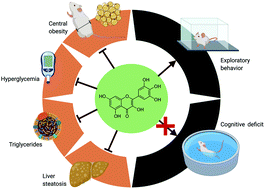Myricetin improves metabolic outcomes but not cognitive deficit associated to metabolic syndrome in male mice
Abstract
Myricetin is a flavonol highly prevalent in edible vegetables and fruits, with recognized hypoglycemic and anti-obesity effects, besides great antioxidant capacity. Thus, this study sought to investigate whether myricetin is able to improve metabolic and behavioral outcomes found in monosodium L-glutamate (MSG) obese mice, a model of metabolic syndrome characterized by early hyperinsulinemia associated to obesity, dyslipidemia, hepatic steatosis, anxiety and cognitive deficit. Newborn male mice received MSG (4 mg kg−1 day−1, s.c.) on alternate days during the first 10 days of life for obesity induction, while control pups received equimolar saline solution. From postnatal day 90 to 135, MSG mice were orally treated with myricetin (50 mg kg−1 day−1) or distilled water, while control animals received vehicle. During the last week of treatment, all groups were submitted to behavioral tests: open field maze, elevated plus maze and Morris water maze. At the end of treatment, animals were euthanized for collection of liver, serum and adipose tissue fat pads. Myricetin treatment reduced the elevated serum levels of glucose and triglycerides, typically found in MSG mice, as well as restored peripheral insulin sensitivity and liver steatosis. Moreover, myricetin ameliorated the lack of thigmotaxis and exploratory behavior, but did not improve the cognitive deficit presented by MSG mice. Therefore, this study contributes to the pharmacological validation of myricetin as an affordable and healthy therapeutic adjuvant for the treatment of metabolic syndrome and most of its comorbidities.



 Please wait while we load your content...
Please wait while we load your content...